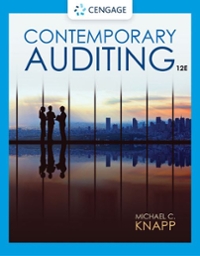Accounting relies on several fundamental assumptions that serve as the foundation for financial reporting. Discuss these key accounting assumptions and their significance in ensuring the
Accounting relies on several fundamental assumptions that serve as the foundation for financial reporting. Discuss these key accounting assumptions and their significance in ensuring the reliability and relevance of financial information. In your response, elaborate on how each assumption impacts the preparation and presentation of financial statements.
Going Concern Assumption: Explain the going concern assumption and its implication for financial reporting. Discuss how this assumption influences the classification of assets and liabilities as current or non-current on the balance sheet. Provide examples of situations where the going concern assumption may be questioned and its impact on financial statements.
Accrual Basis Accounting: Describe the accrual basis of accounting and contrast it with cash basis accounting. Explain how the accrual basis aligns with the matching principle. Provide examples to illustrate how revenue recognition and expense recognition occur under the accrual basis and its importance in reflecting the economic reality of transactions.
Consistency Assumption: Define the consistency assumption and its role in financial reporting. Discuss why consistency is vital in accounting practices, including the comparability of financial statements over time. Explain how changes in accounting policies are handled and disclosed, emphasizing the need for transparency.
Materiality Principle: Elaborate on the materiality principle and its significance in determining what information should be disclosed in financial statements. Discuss how materiality affects the decision to report certain items as separate line items or within notes to the financial statements. Provide examples of materiality considerations in practice.
Historical Cost Assumption: Explain the historical cost assumption and how it contrasts with the fair value measurement approach. Discuss the advantages and limitations of using historical cost as the basis for valuing assets and liabilities on the balance sheet. Provide examples of assets where historical cost may significantly differ from fair value.
Objectivity and Neutrality: Discuss the importance of objectivity and neutrality in financial reporting. Explain how these principles guide the work of auditors and accountants in ensuring the integrity and impartiality of financial statements. Highlight potential conflicts of interest that could compromise objectivity and neutrality.
Periodicity Assumption: Define the periodicity assumption and its role in determining the reporting intervals (e.g., quarterly or annually). Discuss why companies choose different reporting periods and the rationale behind their selection. Explain how the periodicity assumption influences the timing of recognizing revenues and expenses.
Full Disclosure Principle: Describe the full disclosure principle and its significance in providing users of financial statements with comprehensive information. Discuss the types of information that must be disclosed in the notes to the financial statements. Provide examples of situations where the full disclosure principle is particularly important.
Conservatism Principle: Explain the conservatism principle and its impact on financial reporting. Discuss how it influences the recognition of gains and losses, provisions for doubtful accounts, and asset impairments. Highlight the tension between conservatism and neutrality in accounting.
Entity Assumption: Define the entity assumption and its relevance in distinguishing the financial affairs of the business from those of its owners. Discuss how this assumption impacts the separation of personal and business transactions in accounting records. Provide examples of transactions where the entity assumption is crucial.
Step by Step Solution
There are 3 Steps involved in it
Step: 1
Certainly lets delve into the key accounting assumptions and their significance in financial reporting 1 Going Concern Assumption Explanation The going concern assumption assumes that a company will c...
See step-by-step solutions with expert insights and AI powered tools for academic success
Step: 2

Step: 3

Ace Your Homework with AI
Get the answers you need in no time with our AI-driven, step-by-step assistance
Get Started


